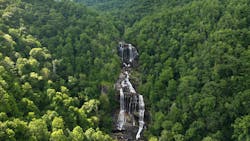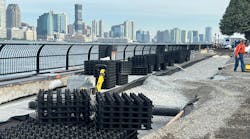New study shows emerging opportunities amid growing dangers of climate change
The Pacific Institute along with Livelihoods Knowledge Exchange Network (LiKEN) and Rural Community Assistance Partnership Incorporated (RCAP) released new research on August 7, 2024, outlining how climate change impacts are leading to devastating consequences for water and wastewater systems in rural communities across the U.S.
The report also introduces an innovative community-centered framework to assist leaders in rural communities to build equitable water and wastewater systems that will be resilient to climate change in the future.
The framework can inform policies and can be adapted and scaled to be used in different rural areas.
The report, titled “Water and Climate Equity in Rural Water Systems in the United State,” highlights these issues in the Southwest and Central Appalachian regions where a concentration of homes lack access to water and sanitation services.
The research emphasizes how legacies of injustice, disproportionate rates of poverty and insufficient financial and technical resources in some rural communities create challenges.
The report also underscores that climate change will continue to exacerbate many existing water challenges, including water quality, affordability, availability and access, as well as aging infrastructure and disaster recovery.
The report includes key findings from different areas across the U.S.
Key findings for the rural U.S. include:
- Extreme flooding events lead to power and water outages, erosion and increased risk of landslide, mobilizing pollutants, polluting of water sources and contamination of rural community drinking water systems.
- Flooding poses a particular risk to decentralized rural water systems and private wells.
- Drought leads to rural groundwater declines through increased reliance on groundwater combined with lack of recharge.
- Wildfires are increasing in extent, duration and severity and rural water is impacted by increased erosion, landslides, sediment and contamination, making water resources and drinking water unsafe.
- Extreme temperatures harm rural water by decreasing water availability, as well as contributing to declining water quality.
Key findings for the U.S. Southwest include:
- Hispanic, Indigenous and low-income communities in many rural water insecurity hotspots in the Southwest are highly susceptible to climate change impacts.
- Colonias, low-income communities along the U.S.-Mexico border in New Mexico, Arizona and California that lack clean water, adequate infrastructure or sanitation and indoor plumbing, face particularly difficult water challenges in the face of climate change.
- Rural Hispanic and Latino communities in California’s Central Valley historically have not received the same access to water infrastructure funding.
- Native Americans in the Southwest region are more likely to live without indoor plumbing compared to white households in the U.S., and many are located in very dry landscapes making them highly exposed to climate impacts.
Key findings for Central Appalachia include:
- Specific climate and water challenges in the region include extreme flooding and temperature fluctuations, drought, lack of household water access, poor water quality and lack of wastewater services.
- Systemic patterns of injustice along with some of the highest rates of Safe Drinking Water Act violations and homes without complete plumbing affect Central Appalachia’s rural communities’ abilities to fund preparing their water and sanitation systems for climate change impacts.
- Rate-paying consumers of these systems are particularly vulnerable to water outages, unreliability, pollutants and increases in the cost of water that climate change will worsen.
The full 107-page report can be found at the Pacific Institute website.


